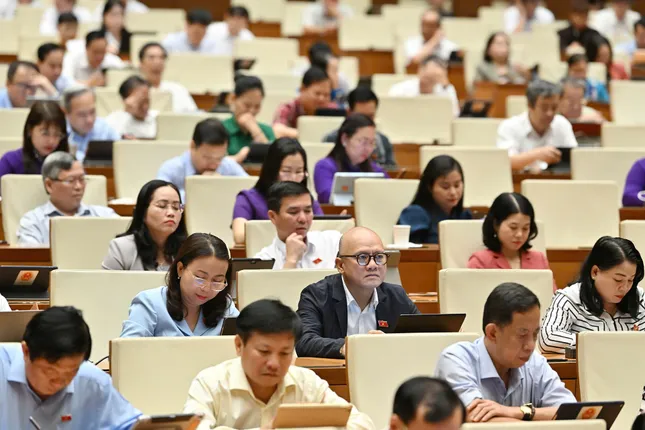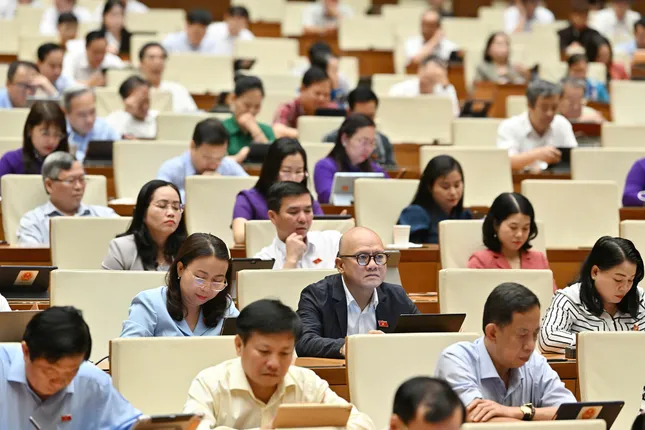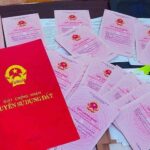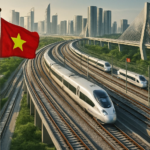Decentralization: How is it allocated?
On June 25, the National Assembly passed the Law amending and supplementing a number of articles in 8 laws related to the finance sector, including: Law amending and supplementing a number of articles of the Law on Bidding; Law on Investment in the form of Public-Private Partnership (PPP); Customs Law; Law on Export and Import Taxes; Investment Law; Public Investment Law; Law on Management and Use of Public Assets.
The passed Law has decentralized the power to approve investment policies of the Prime Minister to local authorities, with 7 groups of projects.

National Assembly delegates at the meeting on June 25. Photo: N.Y.
Specifically, the Provincial People’s Committee (PPC) is authorized to approve investment in the construction of new airports, runways, and passenger and cargo terminals with a capacity of 1 million tons per year or more.
Along with that, the locality is also approved for investment in the construction of housing (for rent, rent-to-buy, or sale), urban areas with an area of 50 hectares or more, or less than 50 hectares but with a population of 15,000 people or more; projects using land of 100 hectares or more or with an area of less than 100 hectares but with a population of 10,000 people or more…
In a report explaining before the National Assembly voted to pass the Law, Minister of Finance Nguyen Van Thang said that this amendment has strongly decentralized the authority to approve investment policies of the Prime Minister to the PPC.
The Government will issue a decree guiding the simplification of administrative procedures for approving investment policies and issuing Investment Registration Certificates.
Mr. Thang said that the Government is conducting a summary of the implementation of the Investment Law. The proposal to consider abolishing the procedure for accepting investment policies will be comprehensively studied and evaluated during this process.
Profit-sharing between the State and BOT projects faces difficulties
Regarding the Law on Investment in the form of Public-Private Partnership (PPP), the mechanism for sharing the increase or decrease in revenue between the State and investors in BOT, BTO, and BOO projects has also been changed.
Specifically, when the actual revenue is higher than the revenue in the financial plan stated in the PPP contract by 110-125%, the investor will share with the State 50% of the difference between the actual revenue and the revenue in the financial plan.
For PPP projects in the field of science and technology, investors do not have to share the increased revenue in the first 3 years of operation and business.
The amended PPP Law also proposes a mechanism for sharing between the State and BOT projects facing difficulties before 2021, which can only be applied once when the project cannot collect service fees, and the actual revenue in the last 3 years is less than 75% of the revenue stated in the PPP contract… due to changes in policies and planning.
The Government believes that supplementing the mechanism to handle the risk of reduced revenue for BOT projects facing difficulties before 2021 is necessary to thoroughly handle difficulties and problems.
There are currently 11 BOT traffic projects with reduced revenue, according to the Government’s statistics. These projects are all inefficient, and the State must take responsibility for handling them because most of the difficulties are due to objective reasons or the fault of State agencies and not the investors.
The Government will issue a decree guiding in detail the ratio of revenue sharing between the State and investors, as well as the responsibility for sharing of investors…
Refining the Legal Framework for PPP Collaboration in Innovation
The Ministry of Finance’s draft decree on public-private partnerships (PPP) in science, technology, innovation, and digital transformation has sparked significant interest. This decree is anticipated to be a vital legal instrument, fostering a paradigm shift towards sustainable growth and development.
The Big Change: Understanding the New Procedures for Obtaining a Red Book as of July 1st
The process of obtaining a land use right certificate, often referred to as a “red book,” is undergoing significant transformations following the nationwide administrative unit merger and the dissolution of the district-level administrative units.
High-Speed North-South Railway: A $70 Billion Venture. Even with Deep Pockets, Vingroup and THACO Require Government Support for this Mega Project!
“Capital raising for this project is not just about sourcing funds, according to Nguyen Quang Thuan, Chairman of FiinGroup and FiinRatings. It also necessitates a transparent and professional implementation mechanism, as well as synchronous reforms in the capital market to attract participation from domestic individuals and enterprises, as well as international investors.”














































